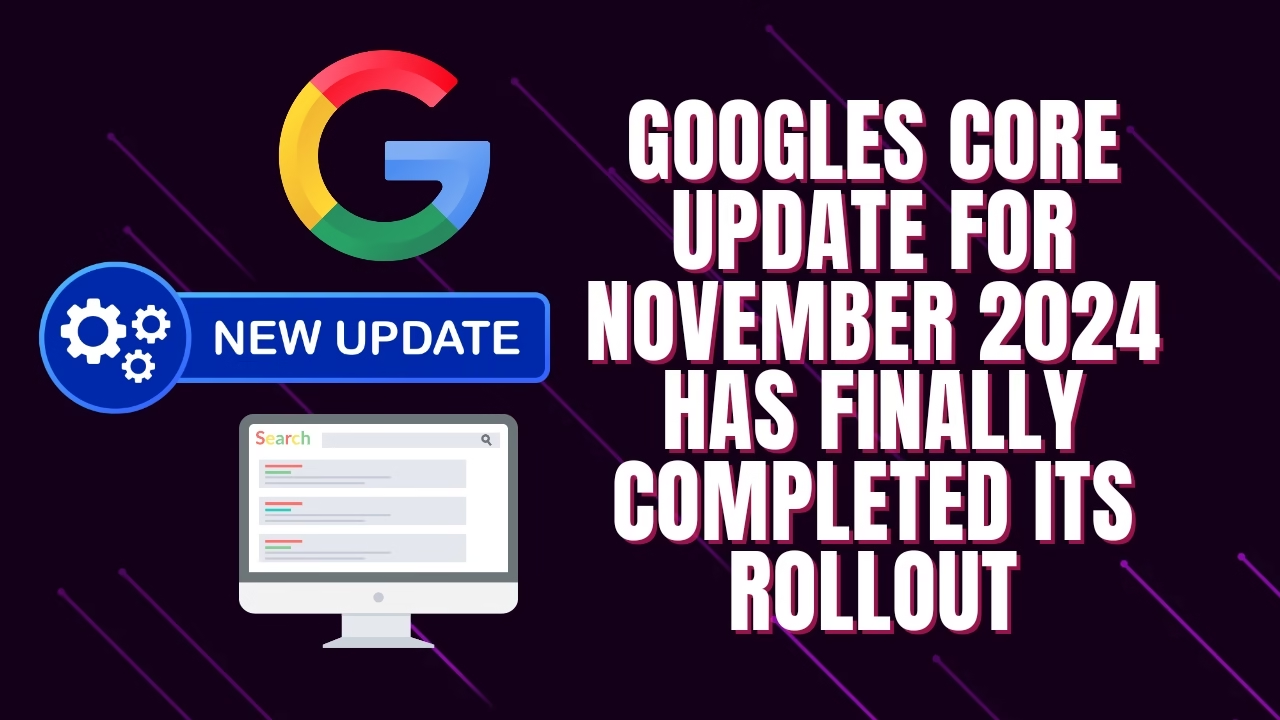Googles Core Update for November 2024 Has Finally Completed Its Rollout
Googles Core Update for November 2024 Has Finally Completed Its Rollout
Anxiety, bewilderment, and unrelenting speculation had characterized the past month.
Digital marketers, SEO experts, and website owners had been waiting impatiently for Google’s November 2024 Core Update to roll out gradually over a few weeks, leaving the sector both anxious and on guard.
As some websites shot to the top of search results while others fell, the internet was ablaze with debates about the changes.
After what seemed like an eternity of changes and adjustments, Google finally announced on December 9, 2024, that the November 2024 Core Update was now fully available.
The Peace Following the Storm:

The update initially appeared to have caused more disruption than usual. The usual suspects’ rankings suffered because of their flimsy content or overly aggressive keyword optimization.
Nonetheless, there was a discernible change in the kinds of websites that were becoming popular.
It became evident in the aftermath that Google had made a significant change to its algorithm. The emphasis had advanced further, as machine learning models improved their comprehension of user intent.
The SEO-heavy strategies of the past were finally defeated by content that felt genuine and captivating. It appeared that the age of “black-hat” tactics had reached a tipping point.
Digital marketing consultant Liam found himself thinking about how much had changed in a matter of weeks.
Following the first waves of the update, he had been observing his clients’ websites fall from the top of the rankings to the middle. This time it felt different, but it wasn’t out of the ordinary.
Websites that had concentrated on offering useful information and had truly helpful, in-depth content appeared to have fared better during the storm than others.
In an unexpected turn of events, many of his clients experienced a sudden spike in traffic after years of refining their content strategies without having to worry about link farms or keyword stuffing.
As Liam flipped through a client’s analytics dashboard, he whispered to himself, “I think we’ve finally reached the turning point.” “Keywords are no longer Google’s only focus. They are looking for actual answers.
The Change in Attention:
Google had been implying for months that “user satisfaction” would be given more importance before the November update.
Although Google’s algorithm has always attempted to ascertain what users want, this update appeared to give it a higher priority.
Websites that used clickbait techniques, dramatic headlines, and deceptive titles were buried in search results. At the same time, content that was clearly helpful, well-researched, and had high user engagement metrics emerged.
One significant modification was Google’s evaluation of the E-E-A-T framework, which stands for Experience, Expertise, Authoritativeness, and Trustworthiness. E-A-T had been crucial in the past, but Google was now emphasizing the “Experience” component.
Pages and articles authored by individuals who truly had first-hand experience with a subject were rewarded more generously than previously.
As a result, the algorithm was more likely to identify experts, professionals in the field, and even ardent enthusiasts who shared their knowledge in.
Websites that depended on AI-generated content without adequate supervision or input from actual experts were also in danger.
The algorithm was now smart enough to recognize when content lacked human insight or depth, even with the advances in AI.
The Effect of Ripples:
The ripple effect started to spread as the update’s last stages were finished. Marketers and content producers quickly adapted, researching changes in rankings to determine how to best optimize their tactics.
New tools that provided deeper insights into user intent and engagement were being developed to assist websites in tracking their evaluations.
After the rollout was finished, forums and communities were ablaze with recommendations within a few days. One SEO specialist wrote, “Pay attention to answering questions rather than just ranking for them.”
“Stop manipulating the system,” another exhorted. Google is more intelligent than that.
It came as no surprise that there were conflicting responses to Google’s official blog post regarding the update.
While some were thrilled with the outcome, others were annoyed by the update’s unpredictability and their dropping rankings.
The idea that companies would need to completely reevaluate their SEO strategies was a common theme in to connects
Relevance, user experience, and authenticity were the main focus of the new era rather than technicalities like backlinks or keyword density.
Search’s Future:
The industry was ablaze with discussions about even more sophisticated algorithms in the weeks after the rollout ended. Google was now doing more than just indexing pages.
